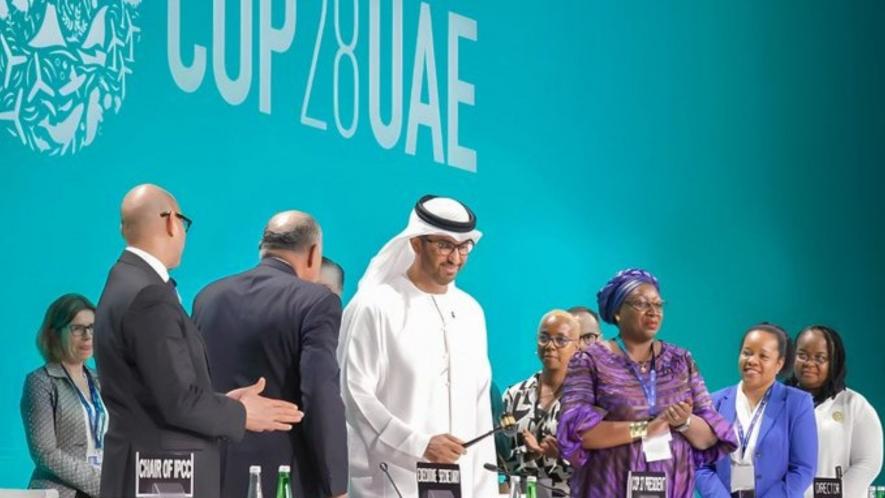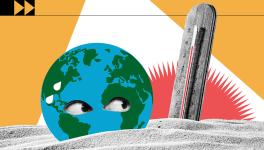COP28: Activists Expect Multiple Obstacles During Health Discussions

COP 28 is inaugurated in Dubai. Photo: COP28UAE/X
The latest United Nations Climate Change Conference (COP28), which began on November 30 in Dubai, is unlikely to be the place where the world’s governments will decide to phase out fossil fuels. Instead, it might be the place where the 1.5 °C target from the Paris Agreement is silently abandoned.
These are two major concerns shared by some climate justice campaigners, including Juliette Mattijsen, a health worker and activist from the Netherlands. “I think those will be very important: the negotiations on fossil fuels, and whether 1.5 °C survives. I think on paper, yes, it survives. But in action, no,” she said.
The participants of COP28 are expected to continue discussing selected topics opened up during the last session, including the practicalities of the Loss and Damage Fund. While one of the conclusions of COP27 was that the fund would be established to provide support to countries most affected by the climate crisis, the details of its implementation are still to be decided. As Mattijsen explained, this means that for now, options on the table include the World Bank hosting the fund, as well as the development of alternative mechanisms.
Regardless of the outcome of this discussion, the fact remains that existing climate debts are already not being paid by high-income countries. To begin with, the promise to mobilize USD 100 billion a year for climate actions in low-and middle-income countries is not being fulfilled. Earlier this year, an Oxfam report estimated that approximately USD 25 billion was raised in 2020. In addition to that, the organization warned that much of the climate funding was coming to low- and middle-income countries in the form of loans, exposing them to even higher financial pressures.
The gap in funding is also recognized in the agenda documentation of COP28, making the negotiations on the dynamics of collecting funds and distributing them one of the key issues that will be confronted over the next two weeks.
Another significant outcome of the last COP was that “health was recognized and mentioned in the final text, which means it’s a topic for this year to discuss,” said Mattijsen. This means that health ministries are going to take part in the negotiations. “In a sense, that’s very positive because they have a lot to win based on climate action in terms of resilience, protecting the health of the people, and finding ways to deal with the climate-harming health systems that many richer countries have.”
Still, many of those working on issues related to climate and health, including Mattijsen, are not convinced significant progress on climate and health will be achieved at COP28. Considering the ongoing presence of fossil fuel industry representatives at the table, putting health on the agenda is not far from “health-washing,” as Mattijsen noted. In this situation, “Health is nominally endorsed, but we are not tackling the root causes of the climate crisis.”
At COP28, the space to articulate dissent from the grassroots is expected to be reduced compared to the standard. Civil society actions will be restricted to the conference venue and the people taking part in the event. Their number is small to begin with: if we put aside representatives of the private sector and academia, activists from fields other than climate represent a single-digit percentage of those taking part in the conversation.
“When I was at COP26 in Glasgow, I was told that there were 500 oil lobbyists. That’s only the oil lobbyists, and does not include the nuclear and all the agro-industries there. We were with 10 people from the health sector,” said Mattijsen.
Far from seeing improvements in broadening participation from the Global South and regulating the space for the private sector, Mattijsen warned that the preparation for COP 28 has seen concerns raised about the amount of information shared with the oil lobby beforehand – given the host’s own links to the sector.
“It’s not that things are happening that were not happening before, or that people are present that were not present before, it’s just it’s open and explicit. They’re openly having this kind of information that civil society does not necessarily have. And that’s why I worry very much that they will have more influence,” said Mattijsen.
People’s Health Dispatch is a fortnightly bulletin published by the People’s Health Movement and Peoples Dispatch. For more articles and to subscribe to People’s Health Dispatch, click here.
Get the latest reports & analysis with people's perspective on Protests, movements & deep analytical videos, discussions of the current affairs in your Telegram app. Subscribe to NewsClick's Telegram channel & get Real-Time updates on stories, as they get published on our website.























